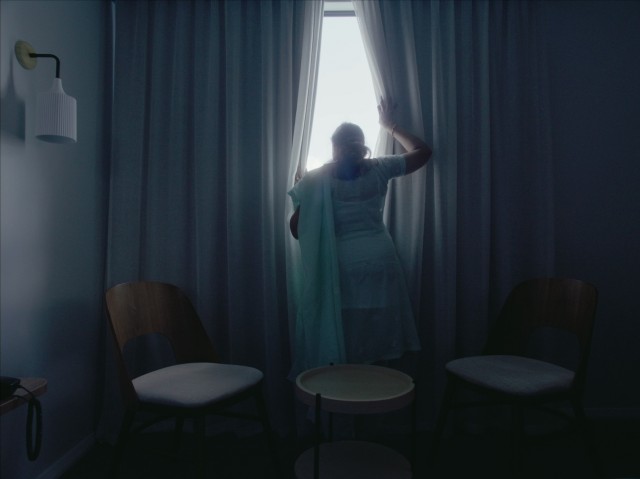Pulkit Arora’s Anu is a quiet but powerful short exploring grief and transition, set against the backdrop of the not-so-distant COVID lockdowns. The film presents a uniquely challenging situation that seeks to answer a profound question: how do we preserve tradition, culture, and a way of life in the face of inevitable change?
“I wrote a film about grief and displacement because I was grieving and being displaced”
Recently widowed, the film’s titular protagonist, Anu, grapples with her grief while in mandated quarantine after moving from India to New Zealand. Dealing with loss is inherently isolating, but Anu’s experience is intensified by the physical confinement imposed on her. Though I’m sure we would all rather forget 2020, Arora’s film takes us back to that turbulent time, as Anu’s journey mirrors the director’s own in his attempt to make sense of it all.
“I suppose I wrote a film about grief and displacement because I was grieving and being displaced”, the writer/director admits. Explaining that he usually chooses projects based around subjects he doesn’t “quite understand”, he hopes that by telling these stories he will become “more certain about what I feel”. With Anu, Pulkit describes it as “an attempt to externalise my loss, watch someone else inhabit it, and find beauty in it all.”
What is remarkable about Arora’s film is its dual exploration of grief – both for a person and a place. As we watch Anu open her suitcase and unpack a life into her tiny, generic hotel room, she appears physically and emotionally adrift, stuck in the liminal space between the old and the new. Her temporary home is the stage for the Pind Daan, a Hindu funerary ritual that grants the departed’s soul salvation. With limited resources, Anu is forced to creatively interpret the rite’s symbols. She collects rice and sesame seeds from her takeout meals, substitutes milk with single-use cups of creamer, and uses the room’s kettle to help shape the pind. She folds marigolds out of a yellow brochure and ignites a makeshift bonfire in the trash bin. Each task could almost be found hilariously surreal, if they weren’t also laced with such poignant, desperate heartache.

Prabha Ravi as Anu, confined to her hotel room due to mandatory quarantine.
Lead actress Prabha Ravi expertly portrays Anu’s sorrow, desperation, and resilience with barely any dialogue, a remarkable achievement on its own. Uttering only two words throughout the entire film, every stage of her grief is vividly expressed through her expressions. “We knew that the film did not need any help convincing the audience to feel; everyone has lost, everyone has grieved”, Pulkit explains as we discuss the production of his short. Keeping the language of his film “restrained” – no music, photography designed to “watch the character from afar” – the director was keen to allow his audience space to “project their own selves” onto his central character.
Anu’s unwavering commitment to performing the ceremony, despite her circumstances, makes for a deeply moving watch. Here is a woman hellbent on honoring her late husband, quarantine or not. Though I’m not of the same faith, I found Anu’s version of the Pind Naan fascinating, as we live in a time where technology intersects with tradition in weird ways. Anu watches a Youtube tutorial on how to perform the ritual at home with a guru encouraging viewers to like, comment, and subscribe. In a world with WhatsApp voice messages and photos, it’s easy to think that solace is always within reach, but we often take for granted the belief that those digital memories will last forever. So, when they inevitably disappear we need to find answers elsewhere. Anu reminds us that with a little hope and resourcefulness, we can still find comfort in our cultural roots, regardless of time or place.

 Irina Wirjan
Irina Wirjan